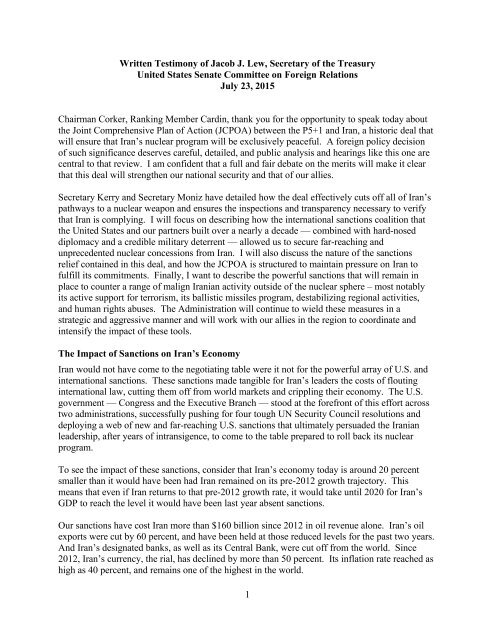WHAT YOU NEED TO KNOW ABOUT THE JCPOA
jcpoa_what_you_need_to_know
jcpoa_what_you_need_to_know
- No tags were found...
You also want an ePaper? Increase the reach of your titles
YUMPU automatically turns print PDFs into web optimized ePapers that Google loves.
Written Testimony of Jacob J. Lew, Secretary of the TreasuryUnited States Senate Committee on Foreign RelationsJuly 23, 2015Chairman Corker, Ranking Member Cardin, thank you for the opportunity to speak today aboutthe Joint Comprehensive Plan of Action (<strong>JCPOA</strong>) between the P5+1 and Iran, a historic deal thatwill ensure that Iran’s nuclear program will be exclusively peaceful. A foreign policy decisionof such significance deserves careful, detailed, and public analysis and hearings like this one arecentral to that review. I am confident that a full and fair debate on the merits will make it clearthat this deal will strengthen our national security and that of our allies.Secretary Kerry and Secretary Moniz have detailed how the deal effectively cuts off all of Iran’spathways to a nuclear weapon and ensures the inspections and transparency necessary to verifythat Iran is complying. I will focus on describing how the international sanctions coalition thatthe United States and our partners built over a nearly a decade — combined with hard-noseddiplomacy and a credible military deterrent — allowed us to secure far-reaching andunprecedented nuclear concessions from Iran. I will also discuss the nature of the sanctionsrelief contained in this deal, and how the <strong>JCPOA</strong> is structured to maintain pressure on Iran tofulfill its commitments. Finally, I want to describe the powerful sanctions that will remain inplace to counter a range of malign Iranian activity outside of the nuclear sphere – most notablyits active support for terrorism, its ballistic missiles program, destabilizing regional activities,and human rights abuses. The Administration will continue to wield these measures in astrategic and aggressive manner and will work with our allies in the region to coordinate andintensify the impact of these tools.The Impact of Sanctions on Iran’s EconomyIran would not have come to the negotiating table were it not for the powerful array of U.S. andinternational sanctions. These sanctions made tangible for Iran’s leaders the costs of floutinginternational law, cutting them off from world markets and crippling their economy. The U.S.government — Congress and the Executive Branch — stood at the forefront of this effort acrosstwo administrations, successfully pushing for four tough UN Security Council resolutions anddeploying a web of new and far-reaching U.S. sanctions that ultimately persuaded the Iranianleadership, after years of intransigence, to come to the table prepared to roll back its nuclearprogram.To see the impact of these sanctions, consider that Iran’s economy today is around 20 percentsmaller than it would have been had Iran remained on its pre-2012 growth trajectory. Thismeans that even if Iran returns to that pre-2012 growth rate, it would take until 2020 for Iran’sGDP to reach the level it would have been last year absent sanctions.Our sanctions have cost Iran more than $160 billion since 2012 in oil revenue alone. Iran’s oilexports were cut by 60 percent, and have been held at those reduced levels for the past two years.And Iran’s designated banks, as well as its Central Bank, were cut off from the world. Since2012, Iran’s currency, the rial, has declined by more than 50 percent. Its inflation rate reached ashigh as 40 percent, and remains one of the highest in the world.1


